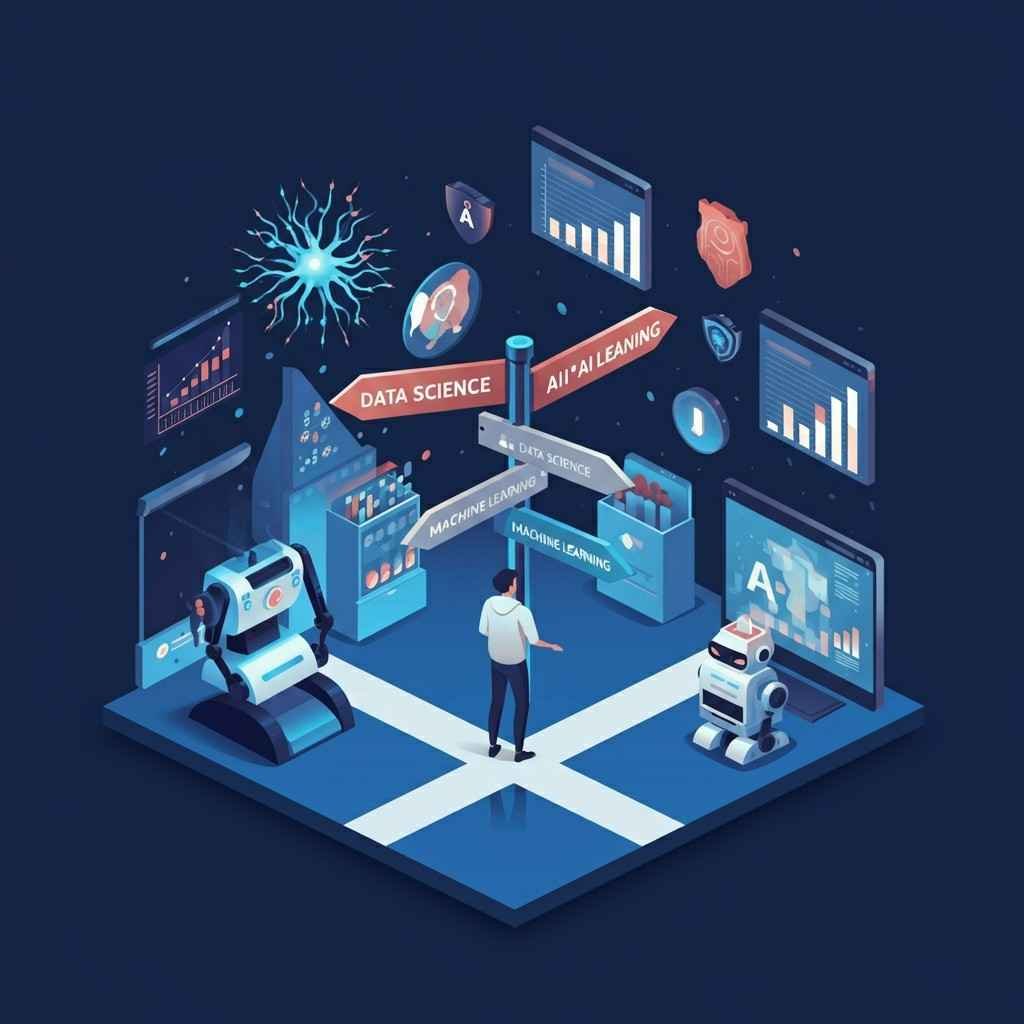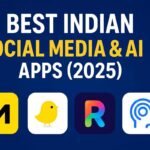
How to Choose the Right Career Path in Artificial Intelligence
Artificial intelligence isn’t just science fiction anymore—it’s reshaping every industry from healthcare to entertainment. If you’re wondering how to break into this exciting field, you’re not alone. The AI job market is booming, with demand for skilled professionals growing faster than ever.
But here’s the thing: choosing an AI career path isn’t as simple as learning to code. The field is vast, with dozens of specializations and countless entry points. Whether you’re a recent graduate or switching careers, this guide will help you navigate the AI landscape and find your perfect fit.
Understanding the AI Career Landscape
What Does AI Actually Include?
Artificial intelligence encompasses much more than robots and chatbots. It’s an umbrella term covering everything from machine learning algorithms that recommend your next Netflix show to computer vision systems that help doctors detect cancer.
The AI field includes several key areas:
- Machine Learning Engineering: Building and deploying ML models
- Data Science: Extracting insights from large datasets
- Research and Development: Creating new AI techniques and algorithms
- AI Product Management: Bridging technical teams and business needs
- AI Ethics and Policy: Ensuring responsible AI development
- Computer Vision: Teaching machines to “see” and interpret images
- Natural Language Processing: Helping computers understand human language
- Robotics: Creating intelligent physical systems
Current Job Market Reality
The artificial intelligence jobs market is red-hot. According to recent industry reports, AI-related positions have grown by over 75% in the past four years. Companies across sectors—from startups to Fortune 500 giants—are desperately seeking AI talent.
But here’s what many career guides won’t tell you: not every AI job requires a PhD in computer science. While technical roles dominate, there’s growing demand for professionals who can bridge AI technology with business applications, ethics, and user experience.
Essential Skills for AI Careers
Technical Foundation Skills
Before diving into specialized areas, you’ll need certain foundational skills. Don’t worry—you don’t need to master everything at once.
Programming Languages
Python leads the pack for AI development, thanks to its simplicity and rich ecosystem of libraries like TensorFlow and PyTorch. R remains popular for statistical analysis, while SQL is essential for database work. JavaScript is increasingly important as AI moves into web applications.
Mathematics and Statistics
You’ll need comfort with linear algebra, calculus, and probability. But here’s the good news: you don’t need to be a math genius. Focus on understanding concepts rather than memorizing formulas. Many successful AI professionals started with basic math skills and learned as they went.
Data Handling
Modern AI runs on data. Learn to clean, process, and analyze datasets. Understanding data visualization tools like Tableau or matplotlib helps communicate your findings effectively.
Soft Skills That Matter
Technical skills get you in the door, but soft skills determine your success.
Problem-Solving Mindset
AI work involves constant troubleshooting. Models don’t work as expected, data is messy, and stakeholders have unrealistic expectations. Developing patience and systematic problem-solving approaches is crucial.
Communication Skills
You’ll often need to explain complex AI concepts to non-technical audiences. Practice translating technical jargon into business language. The ability to tell stories with data is incredibly valuable.
Continuous Learning
AI evolves rapidly. New frameworks, techniques, and best practices emerge constantly. Successful AI professionals stay curious and adaptable.
Educational Pathways Into AI
Traditional Academic Routes
Bachelor’s Degree Options
Computer Science remains the most common entry point, but it’s not the only path. Mathematics, Statistics, Engineering, and even Psychology can provide solid foundations. Many successful AI professionals started in fields like Economics or Physics.
Master’s and PhD Programs
Advanced degrees open doors to research positions and senior roles, but they’re not always necessary. Consider your career goals: research-focused roles often require advanced degrees, while many industry positions value experience over credentials.
Online Learning Alternatives
The internet has democratized AI education. Platforms like Coursera, edX, and Udacity offer comprehensive AI programs. Andrew Ng’s Machine Learning course has launched thousands of careers. The key is choosing structured programs with hands-on projects.
Building Practical Experience
Personal Projects
Nothing beats hands-on experience. Start with simple projects: predict house prices, classify images, or analyze social media sentiment. Share your work on GitHub—recruiters often check portfolios before resumes.
Kaggle Competitions
Kaggle provides real datasets and competitive challenges. Even if you don’t win, participating teaches valuable skills and connects you with the AI community.
Internships and Entry-Level Roles
Look for positions like Data Analyst, Junior Developer, or Research Assistant. These roles provide exposure to AI workflows and team dynamics. Many companies offer AI-adjacent positions that can serve as stepping stones.
Choosing Your AI Specialization
Research vs. Industry Applications
Research Careers
Academic and corporate research roles focus on pushing AI boundaries. You’ll publish papers, attend conferences, and work on cutting-edge problems. These positions typically require advanced degrees and strong theoretical backgrounds.
Industry Applications
Most AI careers involve applying existing techniques to business problems. You might build recommendation systems, optimize supply chains, or develop chatbots. Industry roles often offer higher salaries and faster career progression.
Specific Career Paths to Consider
Machine Learning Engineer
These professionals build and maintain ML systems in production. You’ll work with large-scale data, optimize algorithms for performance, and ensure models work reliably. Average salary ranges from $95,000 to $180,000.
Data Scientist
Data scientists extract insights from data to inform business decisions. The role combines statistical analysis, programming, and business acumen. It’s often called the “sexiest job of the 21st century” for good reason.
AI Product Manager
These roles bridge technical teams and business stakeholders. You’ll define product requirements, prioritize features, and translate customer needs into technical specifications. Strong communication and business skills are essential.
AI Research Scientist
Research scientists develop new AI techniques and algorithms. You’ll work at the forefront of AI advancement, often publishing research and collaborating with academic institutions.
Matching Skills to Opportunities
Consider your natural strengths when choosing a path. Love working with numbers and finding patterns? Data science might suit you. Enjoy building systems and solving technical challenges? Machine learning engineering could be perfect. Fascinated by the implications of AI on society? Explore AI ethics and policy roles.
Breaking Into the AI Field
Building Your Portfolio
Your portfolio is your calling card in AI. Include diverse projects that showcase different skills. A recommendation system demonstrates collaborative filtering knowledge. An image classification project shows computer vision skills. Document your process, challenges faced, and solutions implemented.
Open Source Contributions
Contributing to open source projects demonstrates collaboration skills and technical competence. Start small—fix documentation, report bugs, or implement minor features. Maintainers often become valuable professional connections.
Networking and Community Engagement
The AI community is surprisingly welcoming and collaborative. Attend local meetups, join online forums, and participate in AI conferences. Twitter and LinkedIn are goldmines for connecting with AI professionals and staying updated on industry trends.
Professional Communities
Join organizations like the Association for Computing Machinery (ACM) or attend conferences like NeurIPS and ICML. Many cities have AI/ML meetup groups where professionals share knowledge and job opportunities.
Job Search Strategies
Where to Look
Beyond traditional job boards, check company career pages directly. Many AI roles aren’t widely advertised. Startups often offer more responsibility and learning opportunities, while established companies provide stability and resources.
Tailoring Applications
Customize your resume for each application. Highlight relevant projects and skills. Use keywords from job descriptions—many companies use automated screening tools.
Interview Preparation
AI interviews often include technical challenges, case studies, and behavioral questions. Practice coding problems, prepare to discuss your projects in detail, and be ready to explain complex concepts simply.
Practical Next Steps
Getting Started Today
Don’t wait until you feel “ready”—you never will. Start with these immediate actions:
- Learn Python basics through free resources like Python.org’s tutorial
- Complete an online course like Andrew Ng’s Machine Learning Specialization
- Start a simple project using a dataset that interests you
- Join AI communities on Reddit, Discord, or LinkedIn
- Follow AI researchers and practitioners on social media
Long-term Career Planning
Think beyond your first AI job. Where do you want to be in five years? Technical leadership? Research? Entrepreneurship? Different paths require different skill development strategies.
Continuous Skill Development
Technology changes rapidly in AI. Dedicate time weekly to learning new tools, techniques, or applications. Subscribe to AI newsletters, read research papers (even if you don’t understand everything), and experiment with new frameworks.
Building Your Professional Brand
Share your learning journey. Write blog posts about projects, speak at meetups, or create tutorial videos. Teaching others reinforces your own learning and builds your reputation in the community.
Resources for Continued Learning
Essential Reading
- “Hands-On Machine Learning” by Aurélien Géron
- “The Hundred-Page Machine Learning Book” by Andriy Burkov
- “Weapons of Math Destruction” by Cathy O’Neil (for AI ethics perspective)
Online Platforms
- Coursera: University-level courses from top institutions
- fast.ai: Practical deep learning for coders
- Kaggle Learn: Free micro-courses on specific AI topics
- Papers with Code: Research papers with implementation code
Podcasts and YouTube Channels
Stay updated through AI podcasts like “Lex Fridman Podcast” or “TWiML&AI.” YouTube channels like “3Blue1Brown” explain mathematical concepts visually.
Your AI Journey Starts Now
Choosing a career in artificial intelligence isn’t about finding the “perfect” path—it’s about starting somewhere and adapting as you learn. The field is so dynamic that today’s specializations might look completely different in five years.
Remember: every AI expert was once a beginner. They didn’t start with encyclopedic knowledge or perfect coding skills. They started with curiosity and persistence.
Your background doesn’t limit your potential in AI. Whether you’re coming from finance, biology, art, or any other field, your unique perspective can contribute to AI’s future. The field needs diverse voices and experiences to build technology that serves everyone.
The best time to start your AI career was yesterday. The second-best time is today. Pick a small project, join a community, or sign up for a course. Your journey into artificial intelligence begins with that first step.
AI Career FAQs
Frequently Asked Questions About Choosing a Career in Artificial Intelligence
1. Do I need a computer science degree to work in AI?
No, you don’t necessarily need a computer science degree. While it’s a common path, successful AI professionals come from diverse backgrounds including mathematics, physics, psychology, economics, and even liberal arts. What matters most is developing the right skills—programming, data analysis, and problem-solving—which you can learn through online courses, bootcamps, or self-study. Many companies value practical experience and portfolio projects over formal credentials.
2. What programming languages should I learn for an AI career?
Python is your best starting point—it’s beginner-friendly and dominates the AI landscape with powerful libraries like TensorFlow and PyTorch. SQL is essential for working with databases, while R is valuable for statistical analysis. JavaScript is increasingly important as AI moves into web applications. Focus on mastering Python first, then expand based on your chosen specialization.
3. How much math do I really need to know for AI?
You need a solid understanding of statistics, linear algebra, and basic calculus, but you don’t need to be a math genius. Many successful AI professionals started with basic math skills and learned as they progressed in their careers. Focus on understanding concepts rather than memorizing complex formulas. Online resources like Khan Academy can help you brush up on fundamentals.
4. What’s the difference between data science and machine learning engineering?
Data scientists focus on extracting insights from data to inform business decisions, combining statistical analysis with business acumen. Machine learning engineers build and deploy ML systems in production, focusing on scalability, performance, and reliability. Data science is more analytical and business-oriented, while ML engineering is more technical and system-focused. Both are valuable career paths with different day-to-day responsibilities.
5. Can I transition to AI from a non-technical background?
Absolutely! Many AI professionals started in non-technical fields. Your domain expertise can be incredibly valuable—a marketing professional understanding customer behavior, or a healthcare worker knowing medical workflows, brings unique insights to AI projects. Start by learning basic programming and statistics, then leverage your industry knowledge to work on relevant AI applications.
6. How long does it take to become job-ready in AI?
With dedicated study (10-15 hours per week), you can become job-ready for entry-level positions in 6-12 months. This timeline depends on your background, learning pace, and target role. Focus on building a strong portfolio with 3-5 projects showcasing different AI skills. Remember, learning in AI is continuous—even experienced professionals constantly update their skills.
7. What AI career path offers the best job prospects?
All AI specializations have strong job prospects, but machine learning engineers and data scientists are currently in highest demand. AI product management roles are growing rapidly as companies need professionals who can bridge technical and business teams. Choose based on your interests and strengths rather than just market demand—passion leads to better performance and career satisfaction.
8. How important is getting an AI certification?
Certifications can be helpful for demonstrating commitment and structured learning, especially when transitioning from other fields. However, employers value practical skills and portfolio projects more than certificates. Focus on completing substantial projects and contributing to open-source work. If you pursue certifications, choose reputable programs like those from Google, IBM, or major universities.
9. What’s the best way to build an AI portfolio without work experience?
Start with personal projects using publicly available datasets. Create a recommendation system, build an image classifier, or analyze social media sentiment. Participate in Kaggle competitions to work with real-world data and learn from others. Contribute to open-source AI projects on GitHub. Document your process, challenges, and solutions clearly. Quality matters more than quantity—3-4 well-executed projects are better than 10 basic ones.
10. Should I specialize immediately or stay broad in AI?
Start broad to understand different AI areas, then specialize as you discover your interests and strengths. Spend your first 6 months exploring various AI applications through courses and small projects. Once you identify what excites you—whether it’s computer vision, natural language processing, or AI ethics—dive deeper into that area. You can always pivot or expand your specialization later in your career.
Read more articles here









